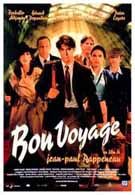Jean-Paul Rappeneau is a director who likes to revisit the past. From the romantic poetry of the 17th century in Cyrano de Bergerac to the tragic cholera epidemic of the 19th century in The Horseman on the Roof, Rappeneau has spent most of his illustrious career traveling back in time, honoring the heroes and heroines of yesteryear, like a faithful historian. Now, 35 years since the debut of his first film, A Matter of Resistance, Rappeneau is at it again, delving deeply into the early days of World War II in Bon Voyage, a magnificent tragicomedy starring Isabelle Adjani and Gérard Depardieu.
Set in Bordeaux in June 1940, Bon Voyage tells the fictional tale of seven disparate characters who converge on the Hotel Splendide on the eve of the German occupation in Paris. Thrust in the midst of this political epicenter is Frédéric Auger (Grégori Derangère), a sweet, unassuming novelist, who flees an abandoned French prison with a roguish inmate named Raoul (Yvan Attal), to search for Viviane Denvert (Isabelle Adjani), a self-absorbed movie star who holds the key to his freedom. Learning that Viviane has headed South with the rest of the French aristocracy, Frédéric and Raoul board a train bound for Bordeaux, where they meet Camille (Virginie Ledoyen), a beautiful, young research assistant trying to protect a Jewish professor named Kopolski (Jean-Marc Stehlé), and his revolutionary apparatus for heavy water -- a key ingredient in the manufacture of atomic bombs -- from falling into German hands.
But when the group finally reaches Bordeaux, after a dangerous journey through the French countryside with two-dozen bottles of heavy water, Frédéric realizes that his beloved Viviane is holed up in the luxurious Hotel Splendide with Jean-Étienne Beaufort (Gérard Depardieu), France’s powerful Interior Minister. That afternoon while Beaufort is meeting with his cabinet to discuss what France should do to regain control of the republic, he notices Frédéric talking to Viviane. Sensing the two are more than just friends, Beaufort invites Frédéric to dine with him at the government table. Then, discovers during a climatic showdown in front of Winckler (Peter Coyote) -- the town reporter -- that Frédéric is an escaped convict wanted in the death of Viviane’s ex-lover, André Arpel (Nicolas Pignon).
Like many films set during World War II, Bon Voyage features a vivid portrait of wartime France that’s as chaotic as it is insightful. Historically, this has always been a very controversial period in French history, and here that’s certainly no exception as director Jean-Paul Rappeneau shows top-ranking government officials, like Beaufort, compromising France’s integrity under the guise of patriotism. However, where Bon Voyage differs from other war films of its era (Think Bertrand Tavernier’s Safe Conduct) is in its playful tone. Paying homage to the historic features of the 1940s, Rappeneau creates a melodramatic farce that’s part action-adventure, part spy drama. Working off a script he co-wrote with French novelist, Patrick Modiano (Search Warrant), Rappeneau once again proves himself quite the auteur, taking a multilayered screenplay, like Bon Voyage, and giving it depth without sacrificing its comic lightness.
Of course, the 72-year-old director owes a huge debt of gratitude to his gifted cast -- especially Adjani and Depardieu -- who know exactly how to shift gears midway through a scene and generate laughs at the most peculiar moments. Not many actors can balance comedy and drama quite as skillfully as they can. In fact, the scene leading up to Viviane’s murder confession is nothing short of brilliant, and will likely earn Adjani her fifth César for Best Actress. As for Depardieu, his ability to play any character -- be it a thief, a drug addict, a lawyer, or a Nazi sympathizer -- without moral judgment is undoubtedly his greatest strength as an actor.
Still, Bon Voyage isn’t without its minor cinematic annoyances -- including a monotonous subplot involving would-be lovers Camille and Frédéric that lingers on to the point of exhaustion. Of course, every film -- no matter how great it is -- has its little flaws, and Bon Voyage is certainly no exception to that rule. But, thanks to its brilliant cast, near perfect direction, and rapturous score -- written by Oscar-winning composer, Gabriel Yared -- Bon Voyage manages to succeed without being just another French farce.
Most Popular





